Sobre as Ciências Sociais - FEP - Universidade do Porto
Sobre as Ciências Sociais - FEP - Universidade do Porto
Sobre as Ciências Sociais - FEP - Universidade do Porto
You also want an ePaper? Increase the reach of your titles
YUMPU automatically turns print PDFs into web optimized ePapers that Google loves.
Carlos Pimenta Complexidade e Interdisciplinaridade n<strong>as</strong> Ciênci<strong>as</strong> <strong>Sociais</strong> Versão 02<br />
Dans tous les <strong>do</strong>maines de la recherche, il n'est question que «d'objets complexes» ou de<br />
«systèmes complexes». Cela ne signifie p<strong>as</strong> qu'un accord définitif existe entre les scientifiques<br />
sur la nature de cette «complexité», surabondamment repérée et invoquée. D'un point de vue<br />
général, la notion de complexité repose sur l'idée fondamentale selon laquelle un système<br />
articulant des éléments divers constitue un tout qui est différent de la somme de ses parties. Elle<br />
implique que l'organisation même de ces éléments produit des émergences, autrement dit qu'elle<br />
développe des propriétés spécifiques qui ne sont p<strong>as</strong> déductibles de la connaissance de chacun de<br />
ces éléments. La seule prise en considération des "interactions entre les éléments" ne suffit plus:<br />
il faut développer de nouveaux instruments de pensée, permettant de saisir des phénomènes de<br />
rétroaction, des logiques récursives, des situations d'autonomie relative. Il s'agit là d'un véritable<br />
défi pour la connaissance, aussi +' bien sur le plan empirique que sur le plan théorique. (…) Dans<br />
cette perspective, l'exploration de la complexité se présente comme le projet de maintenir ouverte<br />
en permanence, dans le travail d'explication scientifique lui-même, la reconnaissance de la<br />
dimension de l'imprédictibilité. (Violette & Outros, 138/9 in Kourilsky & Outros, 2002)<br />
Hegel et Marx ont établi qu’il n’y a ni partis autonomes ni principes premiers : Toute partie existe<br />
par ses relations avec les autres parties dans l’ensemble, et la pensée scientifique qui veut<br />
comprendre la réalité <strong>do</strong>it avancer à ç’intérieur d’un cercle de relations par déplacements<br />
permanents entre l’ensemble et les parties (Godin, Vol. 5, 57)<br />
The subsidiary ple<strong>as</strong>ures that I, <strong>as</strong> an economics professor, gain from the introduction of complex<br />
phenomena and models into my principles course are three-fold. First, I can introduce economic<br />
institutions, government policies, and the conventional practices of mature market economies in<br />
an interesting manner. Instead of presenting them <strong>as</strong> curious hol<strong>do</strong>vers from an unenlightened<br />
age, I can discuss these institutions in relation to the roles that they play in creating and<br />
monitoring the `Rules of the Game' without which a free market system would destabilize itself.<br />
This presentation provides these institutions with a grounding within the curriculum that they<br />
typically <strong>do</strong> not get in the textbooks.' Second, a study of the issues related to complexity allows<br />
economics to be more fully integrated into the social sciences. As mentioned, sociologists have<br />
worked on issues related to the behavior of crowds, and the behavior of groups and organizations<br />
that cannot readily be reduced to the rationality of the several individuals who comprise them.<br />
Strictly speaking, the behavior of groups and organizations is inherently complex.<br />
Acknowledging this reality means that undergraduates, who for the most part have no<br />
commitments to academic rivalries and definitions of `turf', can enjoy the insights that come from<br />
drawing upon several disciplines <strong>as</strong> they organize their own ide<strong>as</strong> about the nature and meaning<br />
of social life and social institutions. Third, history matters. As someone who took a major in both<br />
history and economics <strong>as</strong> an undergraduate, I never <strong>do</strong>ubted the truth of this statement. Indeed, I<br />
have always sought out ways to more fully integrate historical and economic perspectives on the<br />
nature of society. Complexity, with its <strong>as</strong>sociated interests in irreversibility and path dependence,<br />
is one way to integrate history and economics such that the result is indeed more than the sum of<br />
the parts. (Pr<strong>as</strong>ch, in Colander, 2000, 185)<br />
Pág. 2




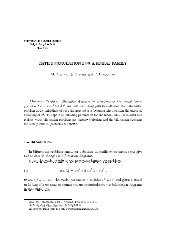
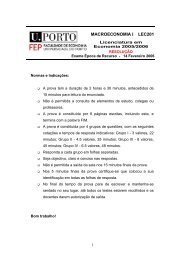


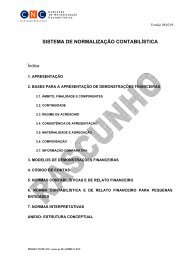
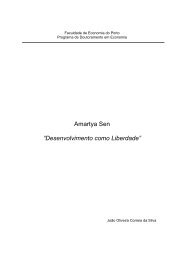
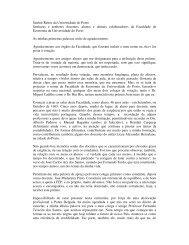
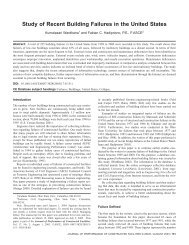
![Republica [Popular] de Moçambique. As Alterações Toponímicas e ...](https://img.yumpu.com/20789614/1/184x260/republica-popular-de-mocambique-as-alteracoes-toponimicas-e-.jpg?quality=85)




